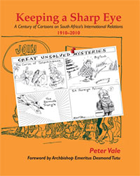Keeping a Sharp Eye: A Century of Cartoons on South Africa’s International Relations, 1910-2010
By Peter Vale
Johannesburg: Otterly Press, 2011
In October 2011, the renowned satirical magazine Private Eye celebrated its fiftieth anniversary with the front cover headline ‘How Satire Makes a Difference’. Accompanying was a picture of Harold Macmillan in 1961 and the epithet ‘Magazine pokes fun at Old Etonian Prime Minister surrounded by cronies making a hash of running the country’ and next to it a picture of the current Old Etonion Prime Minister, David Cameron. Naturally, Private Eye could only offer ‘Er…’ in answer to its claim. The role of satire and political comment by cartoons was at the forefront of my mind when reading Peter Vale’s intriguing and entertaining overview of cartoons focused on South Africa’s international relations. It is clear that cartoonists in South Africa developed the same sharp political antenna and biting critique that characterised their northern European peers. This is noteworthy given the restrictions and perils of being so politically outspoken during the apartheid-era. The prolific post-apartheid cartoonist Zapiro, whose books of cartoons and weekly outputs have assumed a cult status, in many respects constitutes an alternative history of the African National Congress’s period of office. As Vale comments in his brief biography of Zapiro, President Jacob Zuma is currently suing the cartoonist for defamation of character; a significant, if concerning, reflection on the power of cartoonists to expose and goad those in power.
There are over one hundred cartoons reproduced in the book accompanied with brief descriptions of the political, military and diplomatic circumstances they comment on as well as biographical information about the cartoonists. As Vale notes, separating international relations from South Africa’s domestic, socio-economic and political dynamics is not possible and arranging the cartoons either thematically or chronologically is difficult. The book adopts a chronological approach with occasional comparisons of metaphors or recurrent themes in South Africa’s foreign relations, such as the fraught difficulties posed by relations with neighbouring Rhodesia and then Zimbabwe. The cartoons vividly document South Africa’s emergence from the British imperial fold, with the Dominion often depicted as a lion cub, and then chart its subsequent long and disastrous march into the destructiveness and isolation of apartheid-era foreign relations. South Africa came to be characterised as a polecat, reviled for its apartheid policies, a theme that would again be invoked by the cartoonists when the liberated country sat on the UN Security Council and refused to back resolutions that condemned abuses in Zimbabwe, Burma and Sudan. A recurrent theme of the cartoonists is what exactly is South Africa’s role in the world and in Africa? Apartheid South Africa’s increasingly desperate attempts to be considered Western and European are contrasted with the post-apartheid state’s difficult transition to be a responsible African power. The claim to be ‘African’ was made problematic by the widespread xenophobia experienced by African immigrants in South Africa and by the cynicism and alleged hypocrisy levelled at South Africa when it claimed to be at the forefront of defining an ‘African Renaissance’. It is also evident just how much South Africa itself has formed a vexed and contentious problem for international relations over the past century, from Thatcher and Reagan’s attempts to shield the country from the full force of international approbation and sanctions becoming increasingly untenable, to more recent difficulties posed by South Africa’s friendly relations with China. It is perhaps no accident that the country chose such unrelenting and telegenic characters, from Pik Botha and Brand Fourie to Nkosazana Dlamini-Zuma, to try to explain and justify its policies.
A less well-documented aspect of South African cartoons in the book is the cartoonists that endorsed the apartheid-era state’s international relations. The bibliographical note on the cartoonist Boonzaier notes that he was responsible for the ‘Hoggenheimer’ image ‘which caricatured Johannesburg’s capitalists’ in Afrikaans-medium newspaper Die Burger (p. 127). With this metaphor Boonzaier was contributing to a powerful anti-Semitic and anti-English-speaking theme in Afrikaner nationalism. The apartheid-era Department of Foreign Affairs would send a summary of newspaper comment and stories to embassies and sympathetic organisations and individuals, and this was replete with cartoons supportive of the government line, albeit often from the Afrikaans-medium (but also the English-speaking) press. These ‘pro-apartheid’ cartoons reflected the general divisions and contradictions of the press in apartheid South Africa and the widespread compliance of the white community in the state’s actions. The cartoons in Vale’s book mostly expose the follies and illegitimacy of South Africa’s post-war behaviour, but more generally cartoons also trumpeted the apartheid state’s proclaimed strength and defiance, whether by apparent victories on Angolan battlefields or by representing the ANC as the communist terrorists the majority of the white community considered them to be. Nevertheless, the cartoons found in the pages of the book are a powerful means of highlighting the debate and critique of South Africa’s foreign relations and demonstrate that cartoonists have frequently had more insight and truth about the rationale and consequences of the country’s international policies than the political leaders themselves. Vale’s book is by no means a comprehensive account of South Africa’s international relations or of cartoons depicting it (nor does it claim to be), but it is a revealing and thought provoking tour of the last century of South Africa’s troubled international relations
—
Daniel Conway is Lecturer in Politics at Loughborough University. His book Masculinities, Militarisation and the End Conscription Campaign: War Resistance in Apartheid South Africa is published with Manchester University Press and the University of the Witwatersrand Press.
